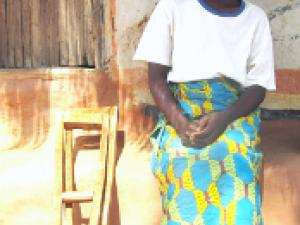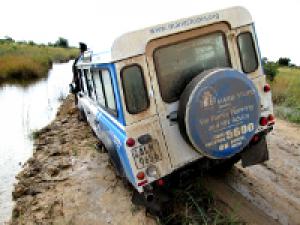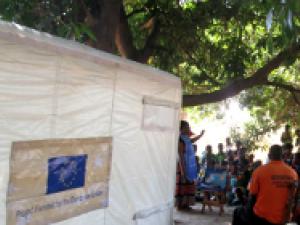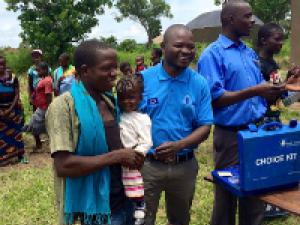Meet Judith Muntahli. She was born in 1977 in Ilenga, a village in the Isoka district of Muchinga Province in the far north of Zambia. She and her husband are subsistence farmers with nine children. During her first pregnancy, Judith (pictured below) was bitten by a snake. But by the time she got to the hospital, infection had set in and her leg had to be amputated. With no access to contraception, Judith carried nine more pregnancies on one leg using crutches. Sadly, her 10th child died when he was a month old.

Judith Muntahli
After hearing that Marie Stopes Zambia (MSZ) was going to visit her village to run a family planning clinic, Judith decided she'd like to hear more about how she could avoid becoming pregnant again. Together with her husband, Judith met the MSZ outreach team to find out more about the different methods of family planning, including short term methods like pills and injectables, long term reversible methods like implants and intra-uterine devices (IUDs), and permanent methods such as tubal ligations (female) and vasectomy (males). Convinced her body couldn't handle yet another pregnancy, in September 2014 Judith decided on having a permanent tubal ligation, which was carried out by one of MSZ’s mobile clinical outreach teams visiting Nabwalya, 167 Km from Mpika.
After the procedure Judith said: "Since I had my tubal ligation my sex life has improved, I don’t worry about falling pregnant ever again, the procedure has given me and my husband a chance to take care of the remaining nine children to give them a better life I never had."
Judith is one of the 26,000 women in Muchinga Province who, by 2016, will be using a modern contraceptive method as a result of MSZ's innovative family planning project, funded over three years (2013-2016) by the European Union in Zambia.
Tackling the teenage pregnancy crisis in Zambia
Zambia has one of the youngest, most rural populations in the world, with 46% of its population under the age of 15 (2010 census). Rates of use of modern methods of contraception in Zambia have improved from 9% in 1992 to 33% in 2007. However, lack of access to family planning services is a major contributor to the 16% of births which are reported in Zambia as unwanted, and particularly the estimated 30% of maternal deaths caused by unsafe abortion (GRZ 2009 statistics cited by LSE 2014). Around 48% of girls in Zambia have given birth at or before the age of 19 (ZDHS 2007), partly due to early marriage, and this age group also accounts for an estimated 80% of unsafe abortions carried out in Zambia. So the need for accessible contraceptive services in Zambia – particularly for unmarried adolescent girls, the sexually active group least likely to be using modern methods of contraception – is profound.

The EU-funded MSZ 'Maternal and sexual-reproductive health rights' project supplements the efforts of the Zambian government to provide underserved rural communities with choices in contraceptive methods (in Muchinga Province, Marie Stopes estimates up to 65% of women have no access to family planning services). The project also supports national plans to raise the national contraceptive prevalence rate for modern methods from 33% to 58% by 2020, as well as contributing to the international push for greater investment in family planning as a very cost-effective pathway to improved health.
Head of the EU Delegation, Ambassador Hervio, said: "On International Women's Day, we remember that protecting the rights and wellbeing of women is at the heart of European values, and a cornerstone of the EU's development partnership with Zambia. Here in Zambia, two of our biggest investments in health and agriculture promise to make important contributions respectively to maternal health and to women's greater participation in Zambia's economic life. MSZ's work in Muchinga Province is contributing to this, and this project is rightly considered an example of how collaborative approaches can make a difference for Zambian women."
Driving up reproductive health: Unpacking the 'camping model'
MSZ's EU-funded 'Maternal and sexual-reproductive health rights' project works in five districts in Muchinga Province and works closely with government District Medical Officers to plan and deliver outreach services across 45 rural health facilities.

These five districts (Mpika, Nakonde, Isoka, Mafinga and Chinsali) are among the most under-served in Zambia both in terms of contraceptive services and healthcare. One of the biggest challenges to delivering contraceptive services in Zambia is dealing with the huge distances between communities and facilities – for example, Mpika District is Zambia's biggest district and is the size of Denmark.
To address this challenge, Marie Stopes uses the camping model. From its bases in Muchinga Province, a customised MSZ Land Rover (pictured) - stuffed with equipment and specialised medical staff - travels up to 200km into some of the most rural parts of the province. Using a network of trained mobilisers, the team let the community know exactly when MSZ will be in the area. With speakers mounted to the vehicle, the MSZ outreach team lets the community know when they have arrived. At the agreed time and place, the team set up the mobile clinic in a health facility when available or within MSZ’s customized clinical tents. At these mobile clinics, the team provides group and individual counselling, HIV testing, contraception (including long-acting implants and the tubal ligation procedure), and offers advice on follow-up.

The mobile clinic itself can be set up in a few hours in any village accessible by a four wheel drive vehicle, which contains everything needed to deliver a wide range of contraceptive services, including sterile equipment and chlorine for infection prevention. Essentially, it's a family planning clinic on wheels: the Land Rover carries all the necessary medical equipment and supplies, which includes specialised tents (pictured) that can be set up outside health facilities and configured into an operating room with adjoining consultation rooms.
Overall, demand hugely exceeds what the project and government health facilities can supply. There is an appointment system in place, yet on some occasions more women turn up for services than can be seen that day, with many of these walking up to 25km. When that happens, the team adjusts its schedule and stays for an extra night, so that the remaining clients can be seen the following day.

Marie Stopes Zambia Country Director Adrienne Quintana said: "The success of this project thus far has arisen in part due to the strong partnership between MSZ staff, traditional leaders and the Government in Muchinga province, who are working together to improve the quality of life for rural women and families. The high uptake of our services is a reflection of the huge unmet need for family planning in this area. With support from traditional leaders, many husbands as well as wives now understand how family planning contributes to the development of their communities, positively impacting on health, education and livelihoods.
"We estimate that the family planning services provided between 2013 and 2015 will save families and the public health system € 2,515,140 in direct healthcare spending, or €3 saved for each € invested in the project."
Project results, aims and objectives

In 2014, using this service delivery model, MSZ saw Judith and more than 8,000 other women (typically between the ages of 14 and 45), including 268 tubal ligations. It is estimated that these services averted 9,876 unwanted pregnancies, and provided 39,998 Couple Years of Protection. Contributing to the capacity development of the public sector, MSZ helped an additional 17 rural government health centres to deliver long-term reversible methods.
The project started in 2013, supported by a grant of 750,000 euros from the EU, with an aim of averting an estimated 49,000 unintended pregnancies, 6,700 unsafe abortions and 120 maternal deaths in Muchinga Province over three years, through:
- Increased accessibility to a variety of modern family planning methods, especially long-acting reversible methods such as implants, and intra-uterine devices.
- Increased support from the community, including the involvement of men, chiefs and community leaders – this is particularly important in reaching unmarried girls under the age of 16 who find it especially hard to find information and services.
- Expanded capacity at existing government health facilities, through training and mentorship of public health workers. MSZ's collaborative approach to working with government is exemplified by their current participation in the Zambian Ministry of Health's family planning technical working group.
Related links
- Marie Stopes International Family Planning page
- EU in Zambia pages on health
- International women's day 2015
- UNFPA report 2014 on cost and development effectiveness of family planning
- Related project: Divine Divas sexual health project
For more information on gender and health you can visit the capacity4dev.eu groups on Gender and Global Health in EC Development Cooperation. March is also the European Year for Development month on Women and Girls. To hear more stories from women and girls like Judith you can visit the EYD website.
This collaborative piece was drafted by James McNulty and Marie Stopes Zambia with support from the capacity4dev.eu Coordination Team. Photos by Marie Stopes Zambia.
(2)
Log in with your EU Login account to post or comment on the platform.
Dear James,
Thank you for this interesting article. Was there an sexual educational programme accompanying the activities? It is usually a good way to increase chances of success, sustainability of results, and to give more choice for women to decide.
Hi Arnaud, thanks very much for your comment. One of the core result areas is the mobilisation of increased support from the community to increase the choices of women. As well as including the involvement of men, chiefs and community leaders, this also involves supporting/training Safe Motherhood Action Groups. So there is no separate sex education programme - although obviously the outreach team do cover this to some extent as part of their family planning counselling. I can put you in touch with the project lead if you have more questions about this! Best wishes from Zambia.